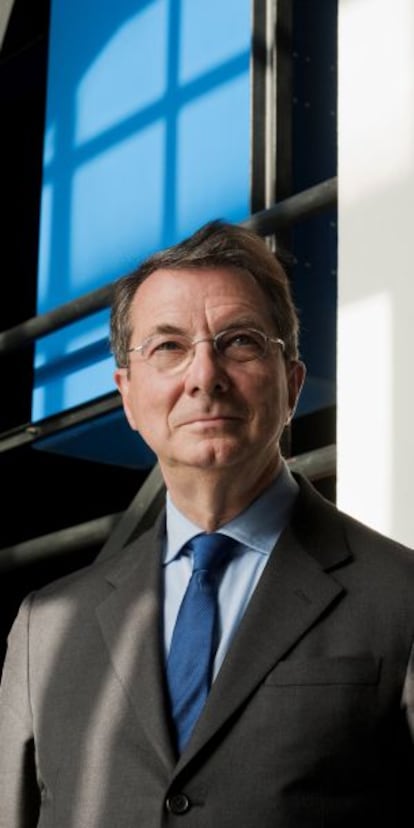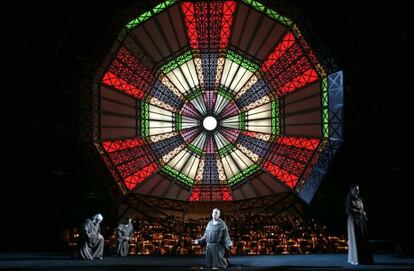"If the government imposes someone I am not happy with, I'm leaving"
Gerard Mortier is the head of Madrid's Teatro Real opera house He has named six foreign candidates to succeed him, but the Culture Ministry wants a Spaniard


In mid-May of this year, Teatro Real director Gerard Mortier was busy bringing his third season at the helm of Madrid's opera house to a close. About to turn 70, he was also working on finding a successor to take over in 2016, when his contract was set to end.
But just around then, the renowned Belgian opera director and administrator received a terrible piece of health news. A cancer forced him to undergo surgery, and Mortier will continue to receive treatment from a German clinic until at least late November. His closest aides already know about his situation. On September 3 he was due to send a letter to his regular collaborators - stage directors, singers and musical directors - to let them know how he plans to take things from here. "I think I must talk about this issue so people who are suffering because of it have more references to go on," explained a notably thinner Mortier in his Brussels apartment.
Meanwhile the other process - the one that will find a new director for the Teatro Real in the coming weeks - is following its course. And Mortier is extremely concerned about it. During a two-hour conversation in which he spoke with his habitual crystal clarity, Mortier described what should have been a decision reached by consensus and a guarantee of continuity for his own vision. Yet the way things are, it looks like his successor will be imposed by the Culture Ministry, based on purely nationalistic criteria: the new Teatro Real director must be a Spaniard.
Mortier, who has directed the Opéra National de Paris, the Théâtre Royal de La Monnaie and the Salzburg Festival, does not even contemplate that possibility: "I can't see anybody in Spain [doing this job] at the present moment."
The parameter must be quality. This kind of thinking no longer exists in Europe"
-You had a few people with international profiles whom you'd already discussed this with. At what stage is the selection process right now?
-Some of the people I proposed were interested in coming, and got in touch with the theater. That was the plan. But now Gregorio Marañón [chairman of the Teatro Real's Board of Trustees] tells me the government wants a Spaniard. That's no problem at all for me, as long as they are a good candidate. But the parameter cannot be nationality, it must be quality. This kind of thinking no longer exists in Europe. In Amsterdam they have a Lebanese director, in Milan they have a Frenchman... it's simply ridiculous.
-Have you been told which candidates the ministry is considering?
-Yes, there are three of them: Antonio Moral [Mortier's predecessor at the Teatro Real], Pedro Halffter [artistic director at the Teatro de la Maestranza] and Joan Matabosch
Right now I don't see candidates in Spain. There is no opera tradition here"
[head of Barcelona's Liceo]. I don't understand why Moral was let go in 2010 and now they are considering hiring him again. Halffter I don't know... and I like Matabosch a lot, but he has nothing to do with the current project. I think our current collaborative work with the Liceo is more valuable than bringing him here. It would ruin the Barcelona project to bring to Madrid an idea that has nothing to do with the line we've been following these last few years. It's all a bit crazy.
Yet of the three, the most likely candidate is Joan Matabosch, who has proven himself to be versatile enough to program risky performances along with much more conservative ones, thus preserving himself from the usual operatic controversies. "Marañón is very much in favor of this option," reveals Mortier, who is still reeling from the fact that apparently nobody is going to take his own opinion into account.
Although Matabosch's profile does not quite fit the requirements of Madrid's most conservative musical circles, he is likely to end up in Madrid soon if Mortier's own proposal is met with rejection. What the Belgian administrator wants is an official call for candidates and a selection committee made up of Teatro Real trustees and advisory council members. It is something akin to the code of good practices formulated under the Socialist administration to ensure that cultural administrators would be selected on objective criteria of quality.
"The people supported by [Education, Culture and Sport Minister] Wert and [Culture Secretary] Lassalle could apply, but also some of the ones I am thinking of," says Mortier.

Under this system, applicants would put their project to the committee, which would then choose one of them and submit this choice to the Board of Trustees. Mortier has already proposed six people: Viktor Schoner (from the Munich Opera), Alexander Neef (Toronto), Serge Dorny (Lyon), John Berry (English National Opera), Pierre Audi (De Nederlandse Opera) and Bernd Loebe (Frankfurt Opera).
"The chairman of the Board of Trustees has already interviewed Schoner and Neef. The winning candidate could join Teatro Real as an assistant in 2014. We would start working together, and I could even leave early, in 2015."
-And if the ministry finally imposes a Spaniard?
Mortier's six proposed successors
- SERGE DORNY. The 50-year-old Belgian is head of the Opéra de Lyon. His vision is similar to Mortier's, especially regarding opera's theatrical side. He has also run the London Philharmonic.
- VIKTOR SCHONER. The executive artistic director of the Munich Opera is one of the favorites and has already been interviewed. The 40-year-old musicologist and philosopher is "extremely intelligent," says Mortier.
- ALEXANDER NEEF. The general director of the Canadian Opera Company is adept at management and good at picking singers. More conservative than Mortier, his major problem is his contract runs until 2020.
- JOHN BERRY. The artistic director of the English National Opera. However, it remains to be seen how a Briton would do heading a Spanish opera house.
- PIERRE AUDI. The director of the Amsterdam opera house for the last 25 years, his reputation is beyond dispute.
- BERND LOEBE. The Frankfurt Opera director succeeded Mortier at Brussels' La Monnaie and is on the same wavelength.
-If the government imposes someone I am not happy with, I will not wait until 2016. I'm leaving. I am not planning on working for a while with a person who does not coincide with the project being developed at Teatro Real.
-Have you been told why they want a Spaniard?
-No. But I have already told Marañón that the decision must be up to the chairman and the Board of Trustees, not the government. I'll be honest, right now I don't see candidates in Spain. This country has a fantastic pictorial and museum tradition, it has extraordinary museum directors. But it's not the same with opera: there is no tradition.
-In recent years Teatro Real has gained tremendous international traction and attracted interest from world-renowned artists such as Michael Haneke. Is your project at risk?
-Absolutely. We'll have to see whether many of them want to work with just any successor.
All the productions for the 2014-2015 season are already secured and part-produced. The same goes for most of the performances in 2015-2016. Because of the long-term nature of opera projects, Mortier's successor should be found sooner rather than later so they can start planning ahead. This person would likely join the team a year before Mortier leaves, so as to familiarize themselves with the workings of the opera house. Now, Mortier's illness is introducing new variables.







































